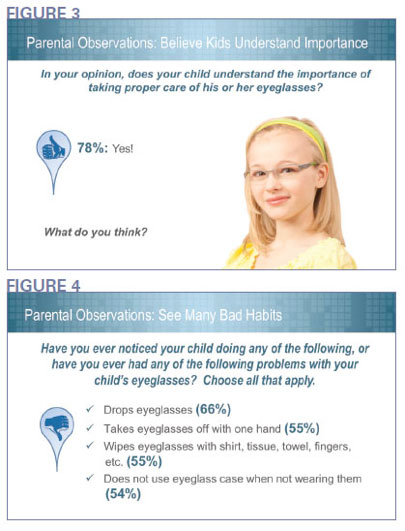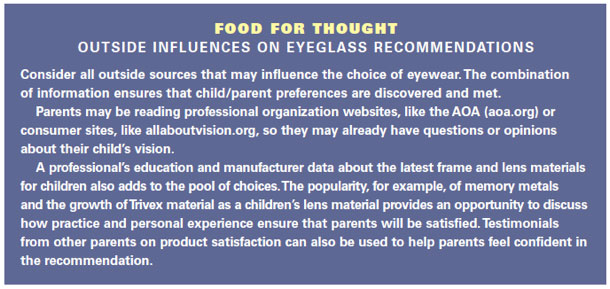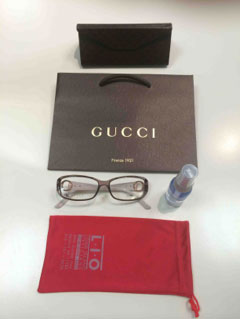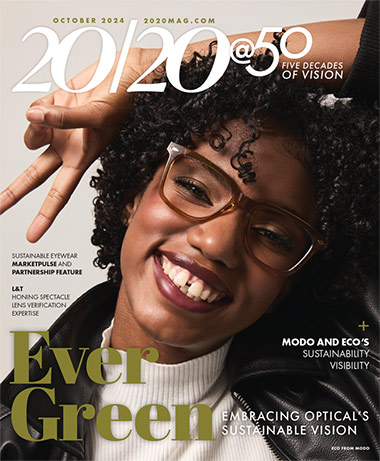THE FIRST PRESCRIPTION
For parents who aren't already aware of the important role of vision correction, discuss the link between their children wearing their glasses (compliance) and the benefits that are being delivered. While education on eyewear care is a critical part of the discussion for new eyeglass wearers, it has to be done in a positive way in order to resonate with kids and avoid creating more pressure on parents than necessary. Focus on the benefits of wearing versus dwelling on the negatives. Every child knows a classmate who already wears glasses. In fact, there are always styles and colors that can be acceptable to parent and child so that wearing takes place.
For example, if you are working with a child who participates in sports, explain to the child how their glasses will help protect their vision and can improve their performance on the field. Or if the child is more interested in books and schoolwork, explain how their glasses will help them focus and learn more on all that there is to discover in the world.
New information supports the concept of "School Readiness Begins at Birth." Many parents are already thinking about what they can do to give their child an advantage at birth. If improving a child's vision is projected to help them in the classroom in the future, parents are more receptive to the discussion even if their child has previously not complained of vision problems.
A vision history of the child is a good place to start. Finding out if the child is struggling in school or finding out what they do (hobbies) and then making the connection for the parents defines what you prescribe/recommend. Children are much more accepting of glasses today, almost looking forward to wearing glasses, especially when they see other kids and celebrities with cool sunglasses or trendy looks.

EYEGLASSES—CARE AND CLEANING
In addition to exploring the right decisions for children's eyewear, the study asked parents, "In your opinion, does your child understand the importance of taking proper care of his or her eyeglasses?" After all, eyeglasses can be a substantial investment, and habits for how well they're cared for start young. This research confirmed several areas where eyecare professionals could play a greater role in parent education, including care for eyewear.
Despite 78 percent of respondents saying they think their children understand the importance of taking care of their eyeglasses, the majority of parents have noticed issues suggesting the opposite.
COMMON CARE ISSUES MENTIONED
More than half of the parents surveyed said that their kids dropped, mishandled or improperly cleaned their eyeglasses or didn't use a case.
Not keeping glasses on or getting them scratched or dirty gets in the way of good visual information. If kids can't see well through their glasses, they think glasses aren't working.
Not using the right case, keeping glasses in a soft case at the bottom of a backpack or no case at all will place frames out of adjustment and make wearing less comfortable. What should parents do?

Unfortunately, only 41 percent of respondents said they were very satisfied with the amount of education their eyecare professional provided to their child on the proper way to care for their eyeglasses, suggesting that more than half felt their eyecare professionals could have done more.
In addition to being taught the proper way to care for eyeglasses, parents should also understand the options available for making lenses more durable, like scratch-resistant lenses and AR coatings. Combined, they prevent scratches and dirt buildup.

TIPS FOR MORE EFFECTIVE CARE
Add a short lens care discussion as part of the exam process, then re-do it at the end of the dispensing process. Ask patients to echo back instructions, adding in humor for kids. In your office, highlight the importance of the doctor speaking directly to kids, especially when they are getting their first pair of glasses. Develop a script that doctors, techs and opticians know for consistency in communications.
Use a personalized care bag (like at the dentist) that includes advice, a bottle of spray cleaner, towelettes in individually sealed packets and a schedule for cleaning (e.g., every morning just after brushing their teeth).
Encourage children to return with eyewear periodically (for instance, every six months) to check on how well their eyewear is performing. Is it being cared for, and if not does it need to be readjusted? Even if frames don't need to be readjusted and the eyewear is performing well, a visit such as this may reinforce compliance with care instructions. Be sure to tell patients to come back for frame adjustments whenever needed. A well-adjusted pair of glasses also lasts longer. For new prescriptions, have them come back in about eight weeks to readjust the glasses, as learning to use them and understanding what's comfortable may take a little time.
CONCLUSION
To promote children's eye health, it is essential to engage their parents. Parents are the gatekeepers to their children's eyecare, controlling how often and whether children visit their eye doctor. Providing information to parents on the latest lens options for children—such as Trivex lenses with anti-reflective coatings—and encouraging proper care of their children's eyewear will create comfort and confidence for the buying process. With frames that fit well and remain in adjustment, and lenses that are safe, clear and comfortable to wear, the glasses will deliver exactly what the doctor intended.
Healthy habits start young, so proper education of parents—and therefore their children—can influence how well a child sees for a lifetime.
To take the American Board of Opticianry (ABO) certified test related to this topic, please click here.












